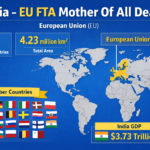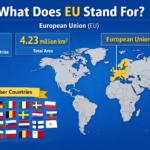AI Action Summit: Unleashing a Revolutionary Wave of Intelligence and Human Ingenuity

On 10 and 11 February 2025, France hosted the Artificial Intelligence (AI) Action Summit. Prime Minister Shri Narendra Modi co-chaired the AI Action Summit along with the President of France. He called for collective global efforts to establish governance and standards that uphold shared values, address risks and build trust. He called for democratizing technology and its people-centric applications so that achieving the Sustainable Development Goals becomes a reality.
The Artificial Intelligence Action Summit declaration calls for policies “ensuring AI is open, inclusive, transparent, ethical, safe, secure and trustworthy.” The declaration outlines the fundamental ground rules for AI development that countries would adhere to. Sixty countries signed the declaration, including Canada, China, France, and India. The United States and the United Kingdom have refused to sign. It revealed a divide in the priorities of some nations.
While Europe is seeking to regulate and invest, China is focused on expanding access through state-backed tech giants, and the US is pushing for a hands-off approach in terms of regulation.
Earlier this year, on January 14, 2024, the IMF published a blog based on their research paper, highlighting that AI could threaten 33 percent of jobs in Advanced Economies, 24 percent in Emerging Markets, and 18 percent in Low-Income Countries. They pointed out that AI will impact 40 percent of jobs worldwide, replacing some and complementing others(technology).
LEARNING FROM HOME/ WITHOUT CLASSES/ BASICS
AI USES
Healthcare
AI has been particularly useful in the healthcare industry because it generates massive amounts of data to train with and enables algorithms to spot patterns faster than human analysts. It can be used to organize bed schedules, make a staff rotation, and provide medical information and diagnosis.
Medecision developed an algorithm to detect 8 variables in diabetes patients and determine if they require hospitalization.
Entertainment
Services like Netflix and Amazon use AI in everyday life by having algorithms analyze the user’s activity and compare it with other users’ activities to recommend shows or products.
The algorithms are becoming intelligent with time—to the extent of understanding that a user may want to buy a product as a gift and not for himself/herself, or that different family members have different watching preferences.
Finance
Financial services companies use AI-based natural language processing tools to analyze brand sentiment from social media platforms and provide actionable advice.
Fraud detection is an important application of AI in financial services. For example, Mastercard uses Decision Intelligence technology to analyze various data points and detect fraudulent transactions. It improves real-time approval accuracy and reduces false declines.
Data security
Cyber attacks are becoming a growing reality with the move to a digital world. There are also concerns about AI programs themselves turning against systems. Automatic exploit generation is a bot that can determine whether a software bug, may cause security issues, is exploitable. If the bot finds a vulnerability, it automatically secures it. AEG systems help develop automated signature generation algorithms that can predict the likelihood of cyberattacks.
Manufacturing
AI algorithms can influence the manufacturing supply chain. It detects the patterns of demand for products across geographies, socio economic segments, and time, and predicts market demand.
Automotive industry
Tesla introduced TeslaBot, an intelligent virtual assistant that allows users to interact with their car from their phone or desktop.
Uber AI Labs is working on developing self-driven cars with the help of the best engineers and scientists.





0 Comments